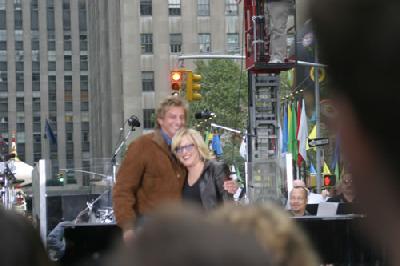Barry Hot
At long last, Manilow plays Vegas. Isn’t it time we gave the man some respect?
By Lorraine Ali
Newsweek
Feb. 14 issue – The first time Barry Manilow played Carnegie Hall was in 1972, as pianist for the burgeoning cabaret star Bette Midler. It was quite a step up from the gay bathhouses they’d been playing to pay the rent. “I remember standing behind the curtain and hearing the audience roar,” recalls Manilow, sitting in a bistro near his home in Palm Springs, Calif. “Bette and I just looked at each other, like, ‘What is that?’ It was so …” He stops, and laughs. “Wait a minute. Here I am telling you the story of my life, like anybody gives a s—. If they do, I’m amazed. Really, I am. I shouldn’t be talking to NEWSWEEK right now, I should be playing a Chuck E. Cheese in Covina.”
You’d have trouble finding an American over the age of 20 who hasn’t cracked a Barry Manilow joke—and that includes Barry Manilow. The operatic pop ballads. The questionable hairdos. The flouncy-sleeved jumpsuit. Manilow was the ’70s. But he still sells 1.5 million records a year, just had a No. 1 single on the dance-club play charts (a remix of his 1978 “Copacabana”) and is now preparing for one of the most anticipated openings in the history of Las Vegas: “Music and Passion,” which kicks off at the Hilton on Feb. 23 and will run into 2006. Though Barry and Vegas seems like a long-overdue marriage, he had his doubts. “Believe me, I had to stop and think,” says Manilow, now 58. “You see, I’ve always walked this fine line between having respect and being cheese. I worried that playing Vegas could push me over into the vat of cheese. But I will not allow it, I promise you that.”
It’s his reputation as a master entertainer that’s kept Manilow viable ever since the hits dropped off in the ’80s and he started making noncommercial jazz albums. Last year his supposed farewell tour sold out stadiums across the country. “It must have been another generation that discovered me,” Manilow says. “Or maybe they were brainwashed by their parents and wanted to see me before I died. ‘Look, he’s still breathing. Buy the ticket!’ ”
Manilow has been performing ever since he was a kid himself. He was raised in Brooklyn by his mother, the daughter of Russian immigrants—his father, a truck-driver for a beer company, left shortly after Barry was born—and “a billion” cousins. Music figured prominently in the household. “If it had been another time and place, my mom could have been Ethel Merman,” says Manilow, in his still-strong Brooklyn accent. “But she couldn’t, so I did it.” He went to Juilliard out of high school, got a job in the CBS mailroom and was married by 22. Four years later he’d left the day job—and the marriage—to jam in Manhattan’s jazz clubs and cabarets.
He started writing commercial jingles, landed a record deal in 1972 and hit the road on his first headliner tour. “I had no idea what to play,” Manilow says, “so I put together a medley of my jingles. They didn’t care what else I did—it was all about the Kentucky Fried Chicken/Dr. Pepper/Trident medley. Oh, and the big crowd pleaser: ‘You deserve a break today.’ I had the bad taste to do it, and they loved it.”
Manilow’s 1973 debut was a jazzy record that didn’t sell well. For his second LP, Arista Records president Clive Davis urged him to do more pop-friendly material. Manilow resisted, but finally Davis brought him a song and politely demanded he do it—and “Mandy” went to No. 1. “It was the first time I actually turned pop radio on and listened,” says Manilow. “What I heard was ‘Boogie, Oogie, Oogie’ and ‘Kung Fu Fighting’—and then there was ‘Mandy.’ I said, ‘Oh, my God! These people need me!’ ”
Whether Manilow saved the decade or destroyed it is still up for debate. (“For every person who says they like me, there’s another that’s, like, ‘Eew, him?’ “) But one thing’s for sure: when you walk into a public space with the man, everyone knows who he is. Manilow tries to keep a low profile; he wears prefaded jeans and a plain black sweater, and prefers to stand in the corner of the hotel lobby. He speaks in hushed tones, though he laughs a bit louder than normal when he cracks jokes about himself—which happens about every 10 minutes. He insists he’s happiest when he’s behind the scenes. “I just backed into this beautiful career of a singing performer,” he says, “but my heart is as a musician, arranger, producer and composer. Putting on makeup and an outfit and being charming to an audience is really hard work for me. If I never had to stand onstage again, I’m not sure how much I’d really miss it.”
Whether you take him at his word or not, performing has been his life, and in the Vegas show, he’ll be tucking his old pop classics into a sort of musical storybook. (In fact, he’s composed two musicals, “Copacabana” and “Harmony”; songs from both appear on his 2004 CD “Scores.”) But Manilow promises there’ll be no Cirque du Soleil characters onstage miming to “Mandy.” “This show is more about storytelling,” he says. “I played piano bars for years, so for one number, I take the audience to my old piano bar. I say, ‘This could have been me, so go to one of those bars and put a $5 bill in their jar and tell ’em thanks from Barry’.” He’s got it backward, of course: piano men should thank Barry for writing all those songs that make their tip jars sing. But isn’t it just like him?
© 2005 Newsweek, Inc.
URL: http://msnbc.msn.com/id/6919090/site/newsweek/







